English Contract Law: Clarity of Rules on Mental Distress Damages
VerifiedAdded on 2023/01/17
|11
|3470
|58
Report
AI Summary
This report delves into the complexities of English contract law, specifically addressing the clarity of rules surrounding the claiming of damages for mental distress resulting from a breach of contract. It provides a comprehensive overview of contract formation, types of contracts, and the concept of breach of contract, including various remedies such as compensatory and punitive damages. The core focus is on damages for mental distress, exploring the legal principles through key case laws like Stanbie v Troman, Farley v Skinner, and Watts v Morrow. The report examines how English courts approach claims for emotional distress, considering factors like the object of the contract and the limitations on awarding such damages. The analysis includes a discussion of the legal bodies involved, such as the Legal Ombudsman and Financial Ombudsman Service, offering a thorough understanding of the subject matter.

English Contract Law
1
1
Paraphrase This Document
Need a fresh take? Get an instant paraphrase of this document with our AI Paraphraser
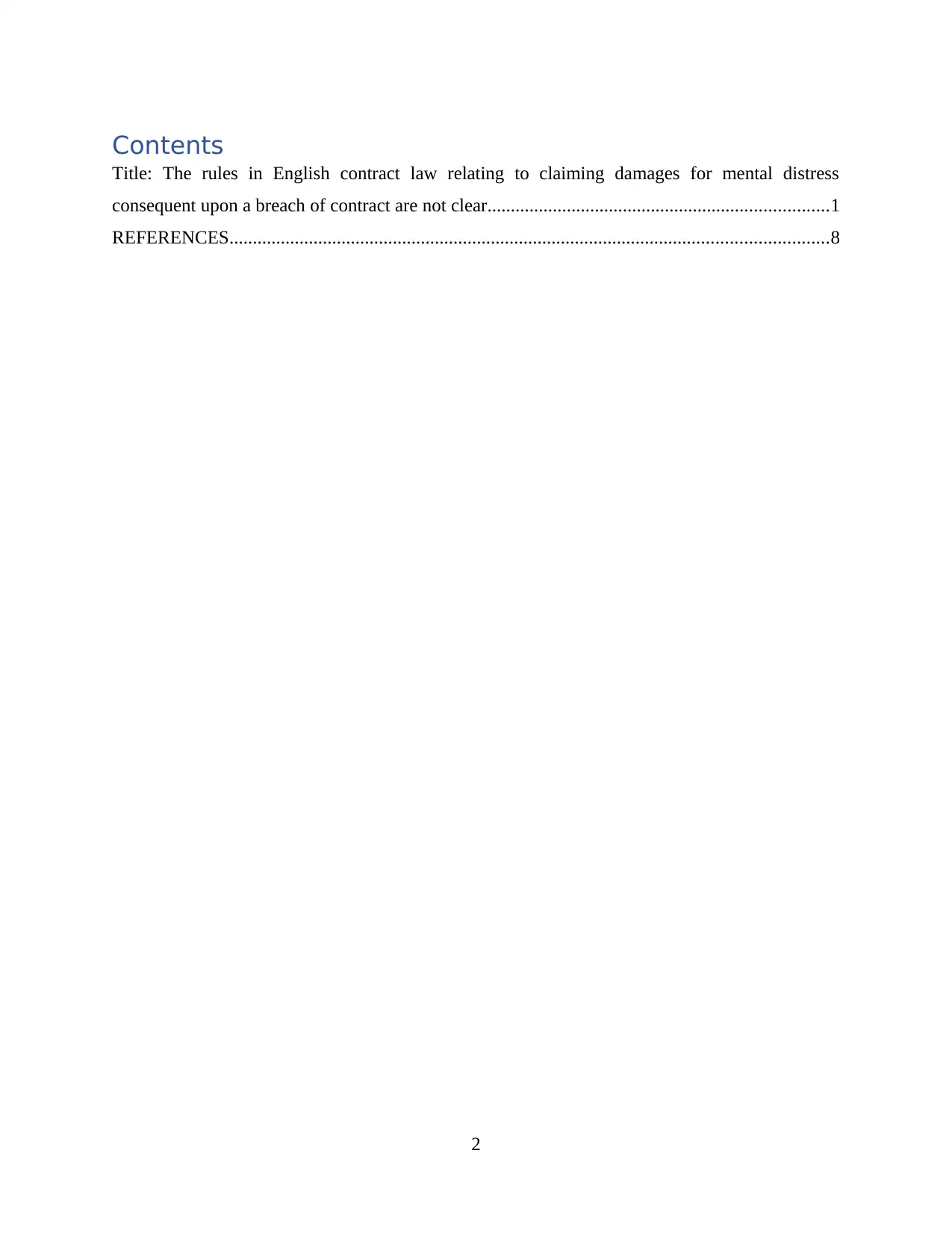
Contents
Title: The rules in English contract law relating to claiming damages for mental distress
consequent upon a breach of contract are not clear.........................................................................1
REFERENCES................................................................................................................................8
2
Title: The rules in English contract law relating to claiming damages for mental distress
consequent upon a breach of contract are not clear.........................................................................1
REFERENCES................................................................................................................................8
2
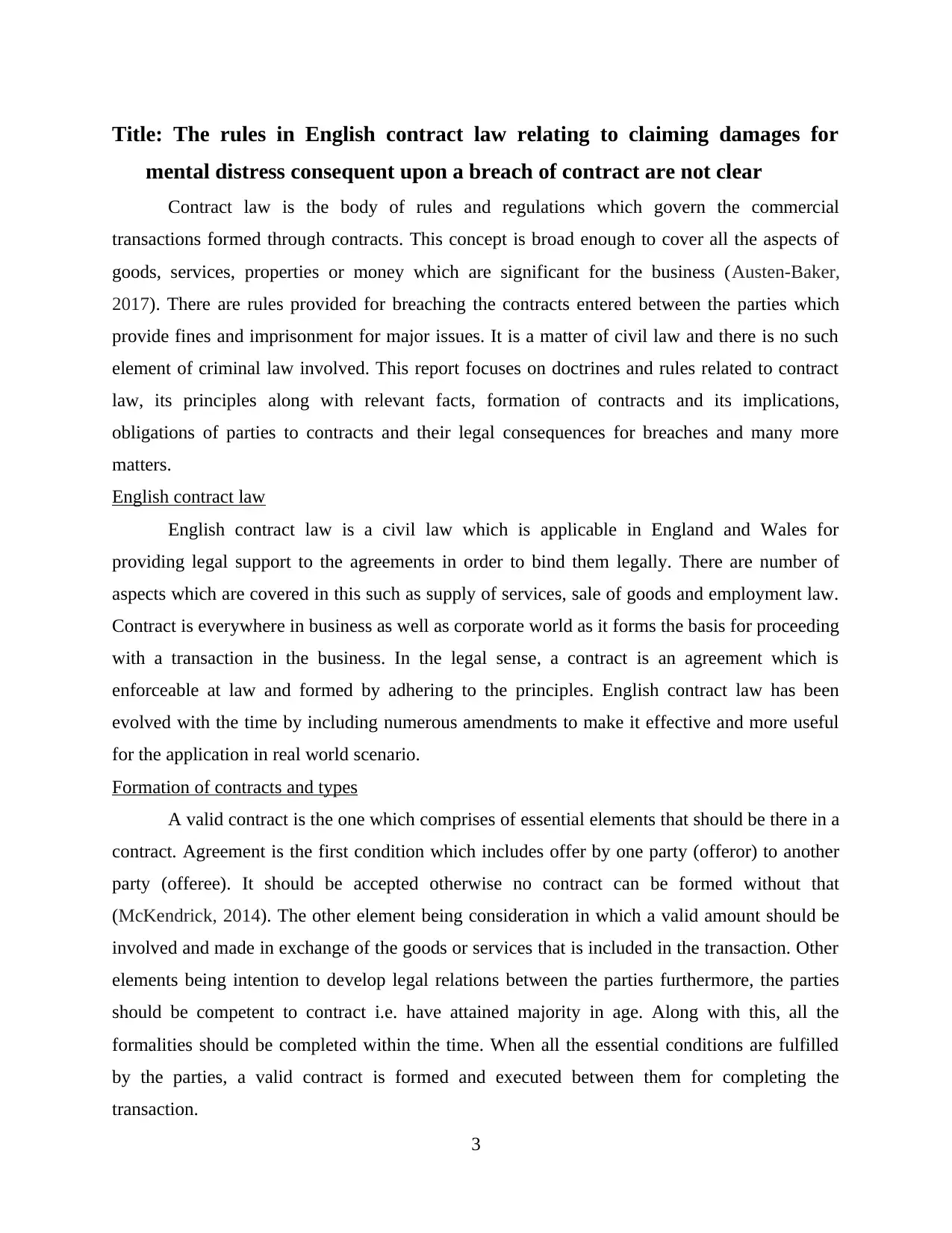
Title: The rules in English contract law relating to claiming damages for
mental distress consequent upon a breach of contract are not clear
Contract law is the body of rules and regulations which govern the commercial
transactions formed through contracts. This concept is broad enough to cover all the aspects of
goods, services, properties or money which are significant for the business (Austen-Baker,
2017). There are rules provided for breaching the contracts entered between the parties which
provide fines and imprisonment for major issues. It is a matter of civil law and there is no such
element of criminal law involved. This report focuses on doctrines and rules related to contract
law, its principles along with relevant facts, formation of contracts and its implications,
obligations of parties to contracts and their legal consequences for breaches and many more
matters.
English contract law
English contract law is a civil law which is applicable in England and Wales for
providing legal support to the agreements in order to bind them legally. There are number of
aspects which are covered in this such as supply of services, sale of goods and employment law.
Contract is everywhere in business as well as corporate world as it forms the basis for proceeding
with a transaction in the business. In the legal sense, a contract is an agreement which is
enforceable at law and formed by adhering to the principles. English contract law has been
evolved with the time by including numerous amendments to make it effective and more useful
for the application in real world scenario.
Formation of contracts and types
A valid contract is the one which comprises of essential elements that should be there in a
contract. Agreement is the first condition which includes offer by one party (offeror) to another
party (offeree). It should be accepted otherwise no contract can be formed without that
(McKendrick, 2014). The other element being consideration in which a valid amount should be
involved and made in exchange of the goods or services that is included in the transaction. Other
elements being intention to develop legal relations between the parties furthermore, the parties
should be competent to contract i.e. have attained majority in age. Along with this, all the
formalities should be completed within the time. When all the essential conditions are fulfilled
by the parties, a valid contract is formed and executed between them for completing the
transaction.
3
mental distress consequent upon a breach of contract are not clear
Contract law is the body of rules and regulations which govern the commercial
transactions formed through contracts. This concept is broad enough to cover all the aspects of
goods, services, properties or money which are significant for the business (Austen-Baker,
2017). There are rules provided for breaching the contracts entered between the parties which
provide fines and imprisonment for major issues. It is a matter of civil law and there is no such
element of criminal law involved. This report focuses on doctrines and rules related to contract
law, its principles along with relevant facts, formation of contracts and its implications,
obligations of parties to contracts and their legal consequences for breaches and many more
matters.
English contract law
English contract law is a civil law which is applicable in England and Wales for
providing legal support to the agreements in order to bind them legally. There are number of
aspects which are covered in this such as supply of services, sale of goods and employment law.
Contract is everywhere in business as well as corporate world as it forms the basis for proceeding
with a transaction in the business. In the legal sense, a contract is an agreement which is
enforceable at law and formed by adhering to the principles. English contract law has been
evolved with the time by including numerous amendments to make it effective and more useful
for the application in real world scenario.
Formation of contracts and types
A valid contract is the one which comprises of essential elements that should be there in a
contract. Agreement is the first condition which includes offer by one party (offeror) to another
party (offeree). It should be accepted otherwise no contract can be formed without that
(McKendrick, 2014). The other element being consideration in which a valid amount should be
involved and made in exchange of the goods or services that is included in the transaction. Other
elements being intention to develop legal relations between the parties furthermore, the parties
should be competent to contract i.e. have attained majority in age. Along with this, all the
formalities should be completed within the time. When all the essential conditions are fulfilled
by the parties, a valid contract is formed and executed between them for completing the
transaction.
3
⊘ This is a preview!⊘
Do you want full access?
Subscribe today to unlock all pages.

Trusted by 1+ million students worldwide
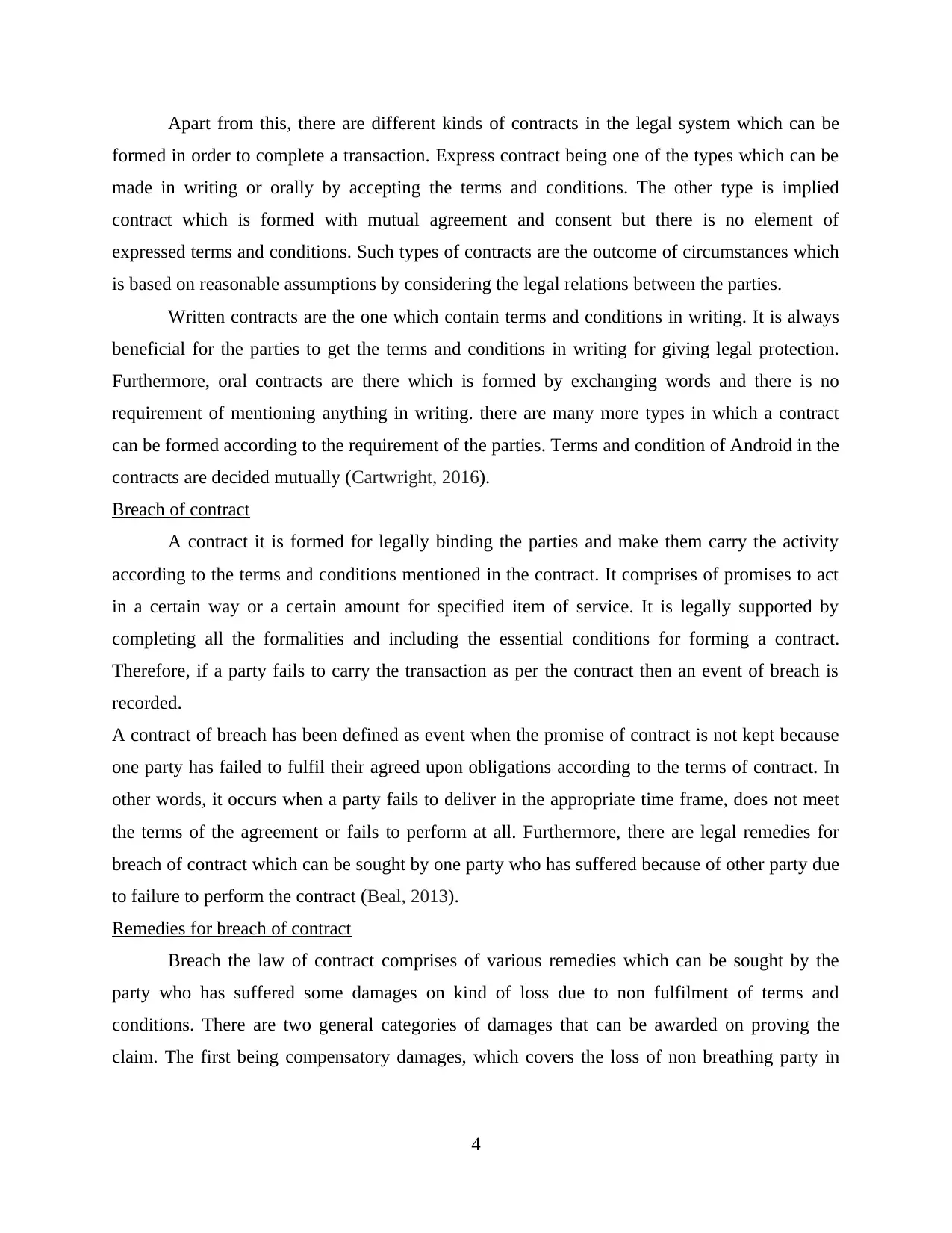
Apart from this, there are different kinds of contracts in the legal system which can be
formed in order to complete a transaction. Express contract being one of the types which can be
made in writing or orally by accepting the terms and conditions. The other type is implied
contract which is formed with mutual agreement and consent but there is no element of
expressed terms and conditions. Such types of contracts are the outcome of circumstances which
is based on reasonable assumptions by considering the legal relations between the parties.
Written contracts are the one which contain terms and conditions in writing. It is always
beneficial for the parties to get the terms and conditions in writing for giving legal protection.
Furthermore, oral contracts are there which is formed by exchanging words and there is no
requirement of mentioning anything in writing. there are many more types in which a contract
can be formed according to the requirement of the parties. Terms and condition of Android in the
contracts are decided mutually (Cartwright, 2016).
Breach of contract
A contract it is formed for legally binding the parties and make them carry the activity
according to the terms and conditions mentioned in the contract. It comprises of promises to act
in a certain way or a certain amount for specified item of service. It is legally supported by
completing all the formalities and including the essential conditions for forming a contract.
Therefore, if a party fails to carry the transaction as per the contract then an event of breach is
recorded.
A contract of breach has been defined as event when the promise of contract is not kept because
one party has failed to fulfil their agreed upon obligations according to the terms of contract. In
other words, it occurs when a party fails to deliver in the appropriate time frame, does not meet
the terms of the agreement or fails to perform at all. Furthermore, there are legal remedies for
breach of contract which can be sought by one party who has suffered because of other party due
to failure to perform the contract (Beal, 2013).
Remedies for breach of contract
Breach the law of contract comprises of various remedies which can be sought by the
party who has suffered some damages on kind of loss due to non fulfilment of terms and
conditions. There are two general categories of damages that can be awarded on proving the
claim. The first being compensatory damages, which covers the loss of non breathing party in
4
formed in order to complete a transaction. Express contract being one of the types which can be
made in writing or orally by accepting the terms and conditions. The other type is implied
contract which is formed with mutual agreement and consent but there is no element of
expressed terms and conditions. Such types of contracts are the outcome of circumstances which
is based on reasonable assumptions by considering the legal relations between the parties.
Written contracts are the one which contain terms and conditions in writing. It is always
beneficial for the parties to get the terms and conditions in writing for giving legal protection.
Furthermore, oral contracts are there which is formed by exchanging words and there is no
requirement of mentioning anything in writing. there are many more types in which a contract
can be formed according to the requirement of the parties. Terms and condition of Android in the
contracts are decided mutually (Cartwright, 2016).
Breach of contract
A contract it is formed for legally binding the parties and make them carry the activity
according to the terms and conditions mentioned in the contract. It comprises of promises to act
in a certain way or a certain amount for specified item of service. It is legally supported by
completing all the formalities and including the essential conditions for forming a contract.
Therefore, if a party fails to carry the transaction as per the contract then an event of breach is
recorded.
A contract of breach has been defined as event when the promise of contract is not kept because
one party has failed to fulfil their agreed upon obligations according to the terms of contract. In
other words, it occurs when a party fails to deliver in the appropriate time frame, does not meet
the terms of the agreement or fails to perform at all. Furthermore, there are legal remedies for
breach of contract which can be sought by one party who has suffered because of other party due
to failure to perform the contract (Beal, 2013).
Remedies for breach of contract
Breach the law of contract comprises of various remedies which can be sought by the
party who has suffered some damages on kind of loss due to non fulfilment of terms and
conditions. There are two general categories of damages that can be awarded on proving the
claim. The first being compensatory damages, which covers the loss of non breathing party in
4
Paraphrase This Document
Need a fresh take? Get an instant paraphrase of this document with our AI Paraphraser
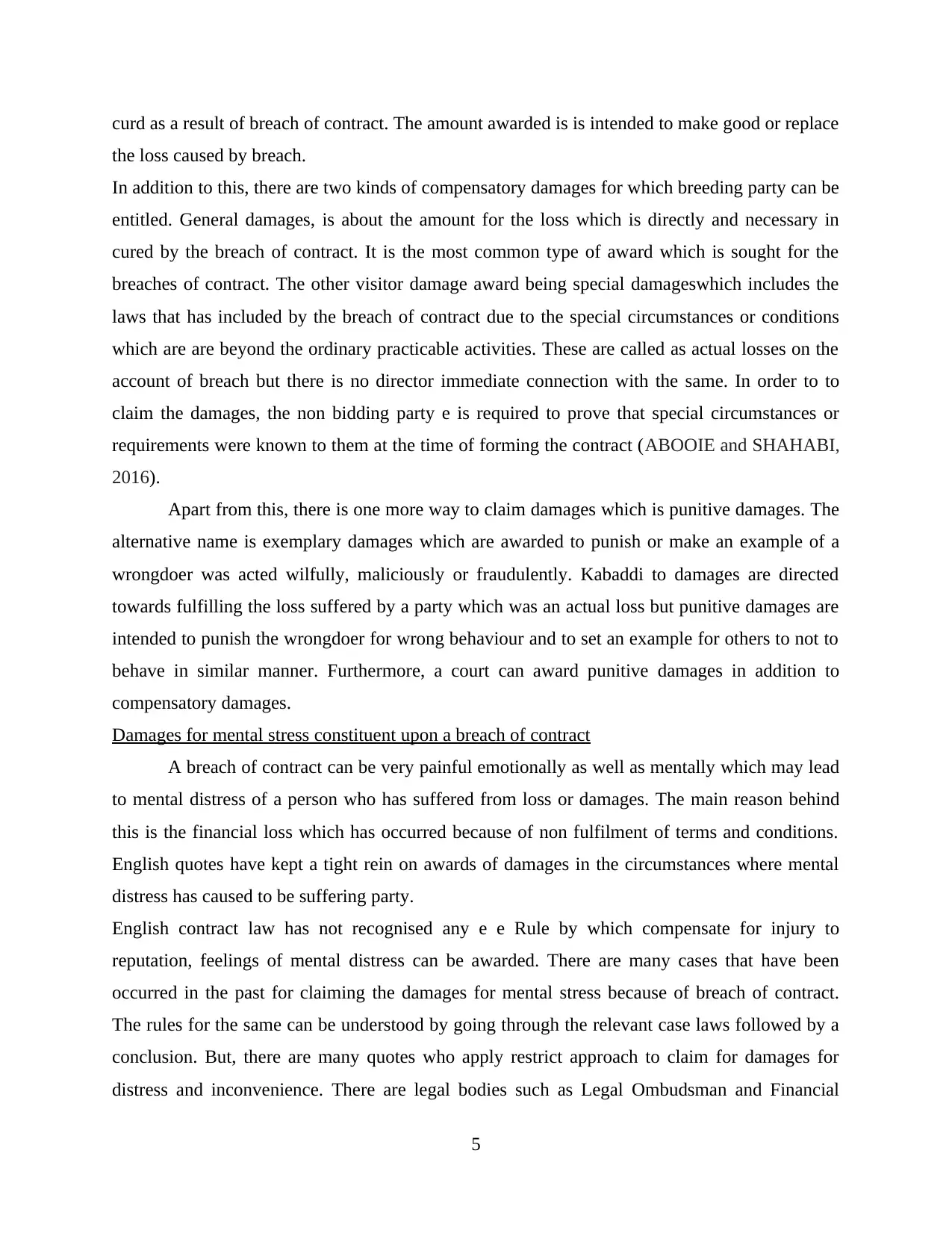
curd as a result of breach of contract. The amount awarded is is intended to make good or replace
the loss caused by breach.
In addition to this, there are two kinds of compensatory damages for which breeding party can be
entitled. General damages, is about the amount for the loss which is directly and necessary in
cured by the breach of contract. It is the most common type of award which is sought for the
breaches of contract. The other visitor damage award being special damageswhich includes the
laws that has included by the breach of contract due to the special circumstances or conditions
which are are beyond the ordinary practicable activities. These are called as actual losses on the
account of breach but there is no director immediate connection with the same. In order to to
claim the damages, the non bidding party e is required to prove that special circumstances or
requirements were known to them at the time of forming the contract (ABOOIE and SHAHABI,
2016).
Apart from this, there is one more way to claim damages which is punitive damages. The
alternative name is exemplary damages which are awarded to punish or make an example of a
wrongdoer was acted wilfully, maliciously or fraudulently. Kabaddi to damages are directed
towards fulfilling the loss suffered by a party which was an actual loss but punitive damages are
intended to punish the wrongdoer for wrong behaviour and to set an example for others to not to
behave in similar manner. Furthermore, a court can award punitive damages in addition to
compensatory damages.
Damages for mental stress constituent upon a breach of contract
A breach of contract can be very painful emotionally as well as mentally which may lead
to mental distress of a person who has suffered from loss or damages. The main reason behind
this is the financial loss which has occurred because of non fulfilment of terms and conditions.
English quotes have kept a tight rein on awards of damages in the circumstances where mental
distress has caused to be suffering party.
English contract law has not recognised any e e Rule by which compensate for injury to
reputation, feelings of mental distress can be awarded. There are many cases that have been
occurred in the past for claiming the damages for mental stress because of breach of contract.
The rules for the same can be understood by going through the relevant case laws followed by a
conclusion. But, there are many quotes who apply restrict approach to claim for damages for
distress and inconvenience. There are legal bodies such as Legal Ombudsman and Financial
5
the loss caused by breach.
In addition to this, there are two kinds of compensatory damages for which breeding party can be
entitled. General damages, is about the amount for the loss which is directly and necessary in
cured by the breach of contract. It is the most common type of award which is sought for the
breaches of contract. The other visitor damage award being special damageswhich includes the
laws that has included by the breach of contract due to the special circumstances or conditions
which are are beyond the ordinary practicable activities. These are called as actual losses on the
account of breach but there is no director immediate connection with the same. In order to to
claim the damages, the non bidding party e is required to prove that special circumstances or
requirements were known to them at the time of forming the contract (ABOOIE and SHAHABI,
2016).
Apart from this, there is one more way to claim damages which is punitive damages. The
alternative name is exemplary damages which are awarded to punish or make an example of a
wrongdoer was acted wilfully, maliciously or fraudulently. Kabaddi to damages are directed
towards fulfilling the loss suffered by a party which was an actual loss but punitive damages are
intended to punish the wrongdoer for wrong behaviour and to set an example for others to not to
behave in similar manner. Furthermore, a court can award punitive damages in addition to
compensatory damages.
Damages for mental stress constituent upon a breach of contract
A breach of contract can be very painful emotionally as well as mentally which may lead
to mental distress of a person who has suffered from loss or damages. The main reason behind
this is the financial loss which has occurred because of non fulfilment of terms and conditions.
English quotes have kept a tight rein on awards of damages in the circumstances where mental
distress has caused to be suffering party.
English contract law has not recognised any e e Rule by which compensate for injury to
reputation, feelings of mental distress can be awarded. There are many cases that have been
occurred in the past for claiming the damages for mental stress because of breach of contract.
The rules for the same can be understood by going through the relevant case laws followed by a
conclusion. But, there are many quotes who apply restrict approach to claim for damages for
distress and inconvenience. There are legal bodies such as Legal Ombudsman and Financial
5
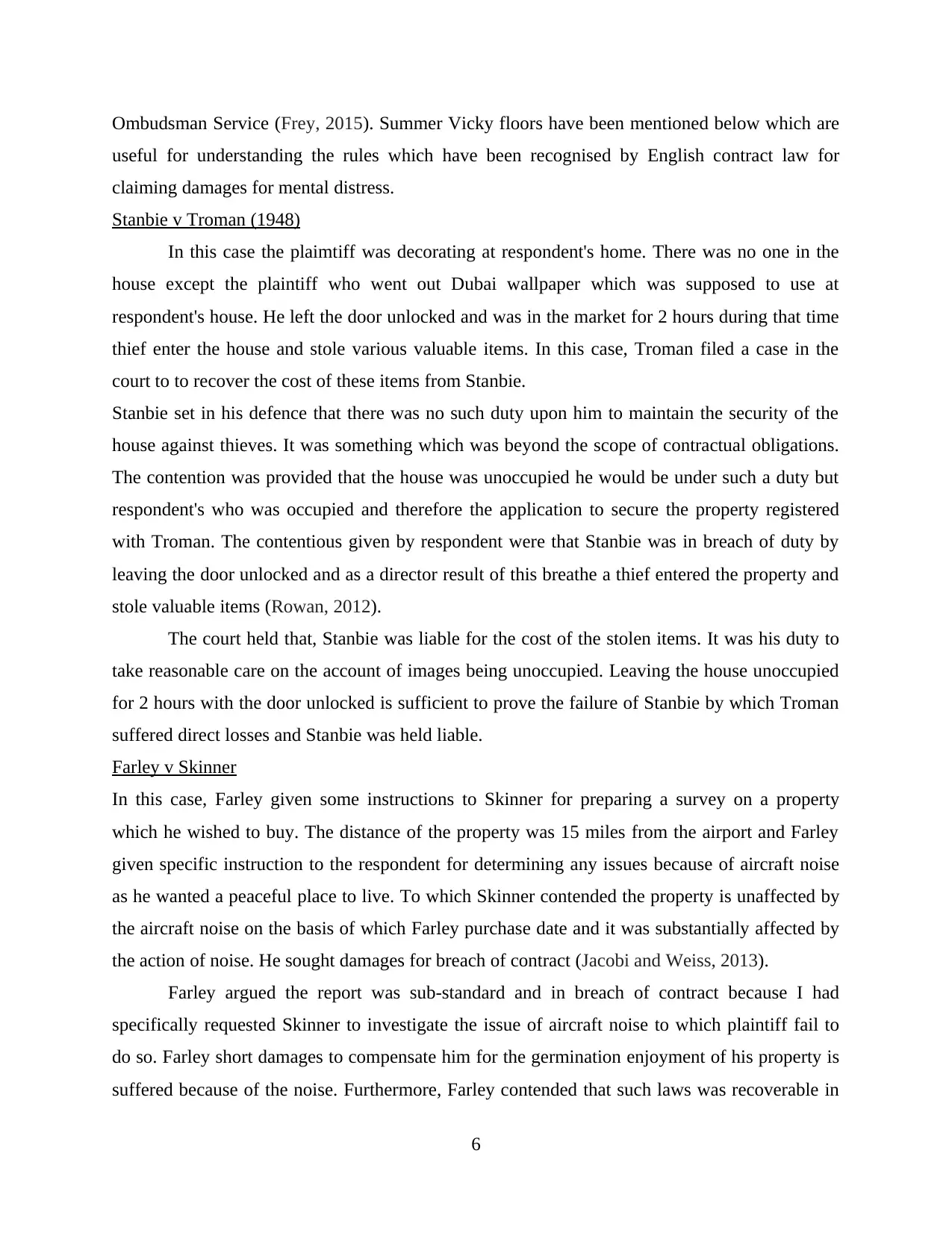
Ombudsman Service (Frey, 2015). Summer Vicky floors have been mentioned below which are
useful for understanding the rules which have been recognised by English contract law for
claiming damages for mental distress.
Stanbie v Troman (1948)
In this case the plaimtiff was decorating at respondent's home. There was no one in the
house except the plaintiff who went out Dubai wallpaper which was supposed to use at
respondent's house. He left the door unlocked and was in the market for 2 hours during that time
thief enter the house and stole various valuable items. In this case, Troman filed a case in the
court to to recover the cost of these items from Stanbie.
Stanbie set in his defence that there was no such duty upon him to maintain the security of the
house against thieves. It was something which was beyond the scope of contractual obligations.
The contention was provided that the house was unoccupied he would be under such a duty but
respondent's who was occupied and therefore the application to secure the property registered
with Troman. The contentious given by respondent were that Stanbie was in breach of duty by
leaving the door unlocked and as a director result of this breathe a thief entered the property and
stole valuable items (Rowan, 2012).
The court held that, Stanbie was liable for the cost of the stolen items. It was his duty to
take reasonable care on the account of images being unoccupied. Leaving the house unoccupied
for 2 hours with the door unlocked is sufficient to prove the failure of Stanbie by which Troman
suffered direct losses and Stanbie was held liable.
Farley v Skinner
In this case, Farley given some instructions to Skinner for preparing a survey on a property
which he wished to buy. The distance of the property was 15 miles from the airport and Farley
given specific instruction to the respondent for determining any issues because of aircraft noise
as he wanted a peaceful place to live. To which Skinner contended the property is unaffected by
the aircraft noise on the basis of which Farley purchase date and it was substantially affected by
the action of noise. He sought damages for breach of contract (Jacobi and Weiss, 2013).
Farley argued the report was sub-standard and in breach of contract because I had
specifically requested Skinner to investigate the issue of aircraft noise to which plaintiff fail to
do so. Farley short damages to compensate him for the germination enjoyment of his property is
suffered because of the noise. Furthermore, Farley contended that such laws was recoverable in
6
useful for understanding the rules which have been recognised by English contract law for
claiming damages for mental distress.
Stanbie v Troman (1948)
In this case the plaimtiff was decorating at respondent's home. There was no one in the
house except the plaintiff who went out Dubai wallpaper which was supposed to use at
respondent's house. He left the door unlocked and was in the market for 2 hours during that time
thief enter the house and stole various valuable items. In this case, Troman filed a case in the
court to to recover the cost of these items from Stanbie.
Stanbie set in his defence that there was no such duty upon him to maintain the security of the
house against thieves. It was something which was beyond the scope of contractual obligations.
The contention was provided that the house was unoccupied he would be under such a duty but
respondent's who was occupied and therefore the application to secure the property registered
with Troman. The contentious given by respondent were that Stanbie was in breach of duty by
leaving the door unlocked and as a director result of this breathe a thief entered the property and
stole valuable items (Rowan, 2012).
The court held that, Stanbie was liable for the cost of the stolen items. It was his duty to
take reasonable care on the account of images being unoccupied. Leaving the house unoccupied
for 2 hours with the door unlocked is sufficient to prove the failure of Stanbie by which Troman
suffered direct losses and Stanbie was held liable.
Farley v Skinner
In this case, Farley given some instructions to Skinner for preparing a survey on a property
which he wished to buy. The distance of the property was 15 miles from the airport and Farley
given specific instruction to the respondent for determining any issues because of aircraft noise
as he wanted a peaceful place to live. To which Skinner contended the property is unaffected by
the aircraft noise on the basis of which Farley purchase date and it was substantially affected by
the action of noise. He sought damages for breach of contract (Jacobi and Weiss, 2013).
Farley argued the report was sub-standard and in breach of contract because I had
specifically requested Skinner to investigate the issue of aircraft noise to which plaintiff fail to
do so. Farley short damages to compensate him for the germination enjoyment of his property is
suffered because of the noise. Furthermore, Farley contended that such laws was recoverable in
6
⊘ This is a preview!⊘
Do you want full access?
Subscribe today to unlock all pages.

Trusted by 1+ million students worldwide
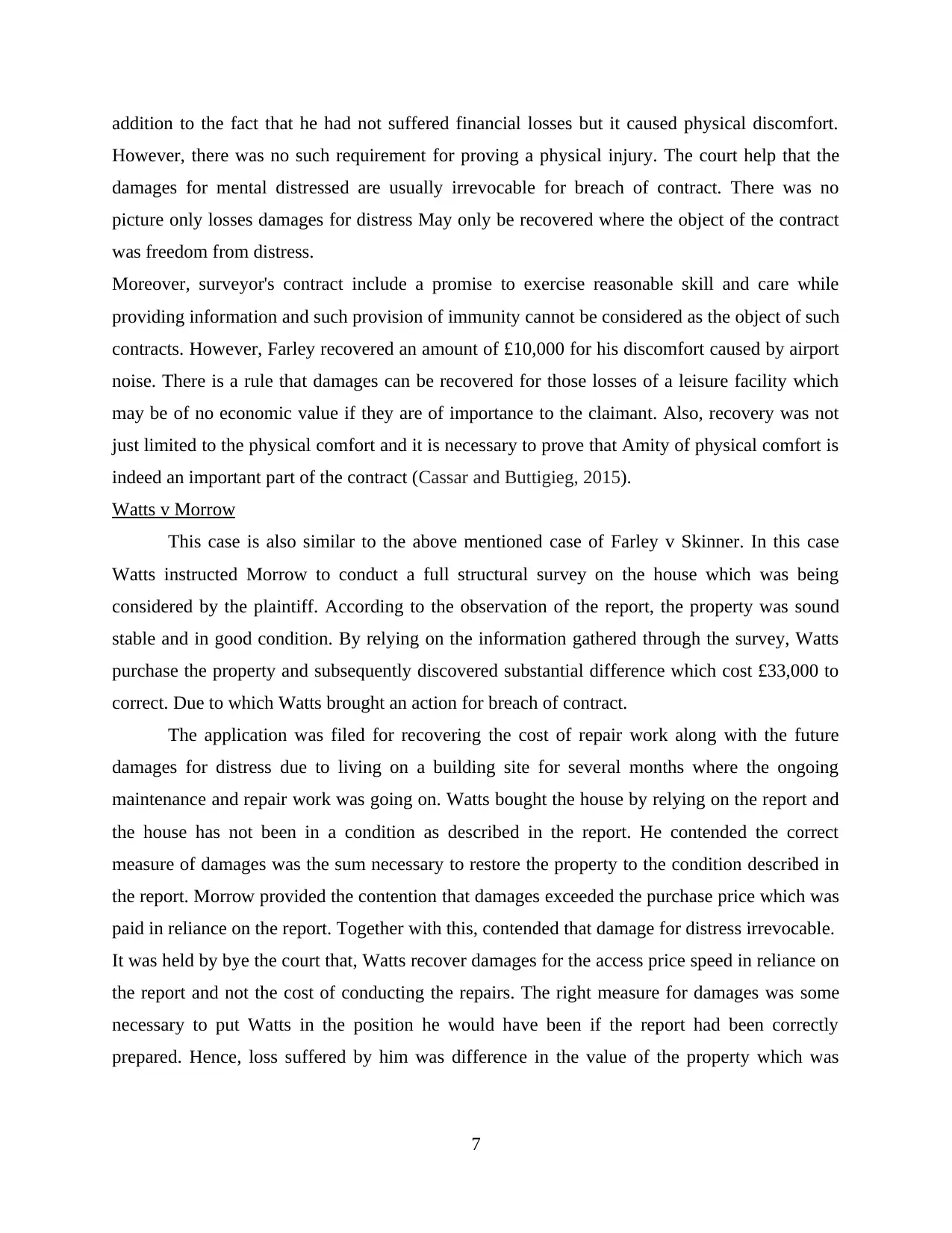
addition to the fact that he had not suffered financial losses but it caused physical discomfort.
However, there was no such requirement for proving a physical injury. The court help that the
damages for mental distressed are usually irrevocable for breach of contract. There was no
picture only losses damages for distress May only be recovered where the object of the contract
was freedom from distress.
Moreover, surveyor's contract include a promise to exercise reasonable skill and care while
providing information and such provision of immunity cannot be considered as the object of such
contracts. However, Farley recovered an amount of £10,000 for his discomfort caused by airport
noise. There is a rule that damages can be recovered for those losses of a leisure facility which
may be of no economic value if they are of importance to the claimant. Also, recovery was not
just limited to the physical comfort and it is necessary to prove that Amity of physical comfort is
indeed an important part of the contract (Cassar and Buttigieg, 2015).
Watts v Morrow
This case is also similar to the above mentioned case of Farley v Skinner. In this case
Watts instructed Morrow to conduct a full structural survey on the house which was being
considered by the plaintiff. According to the observation of the report, the property was sound
stable and in good condition. By relying on the information gathered through the survey, Watts
purchase the property and subsequently discovered substantial difference which cost £33,000 to
correct. Due to which Watts brought an action for breach of contract.
The application was filed for recovering the cost of repair work along with the future
damages for distress due to living on a building site for several months where the ongoing
maintenance and repair work was going on. Watts bought the house by relying on the report and
the house has not been in a condition as described in the report. He contended the correct
measure of damages was the sum necessary to restore the property to the condition described in
the report. Morrow provided the contention that damages exceeded the purchase price which was
paid in reliance on the report. Together with this, contended that damage for distress irrevocable.
It was held by bye the court that, Watts recover damages for the access price speed in reliance on
the report and not the cost of conducting the repairs. The right measure for damages was some
necessary to put Watts in the position he would have been if the report had been correctly
prepared. Hence, loss suffered by him was difference in the value of the property which was
7
However, there was no such requirement for proving a physical injury. The court help that the
damages for mental distressed are usually irrevocable for breach of contract. There was no
picture only losses damages for distress May only be recovered where the object of the contract
was freedom from distress.
Moreover, surveyor's contract include a promise to exercise reasonable skill and care while
providing information and such provision of immunity cannot be considered as the object of such
contracts. However, Farley recovered an amount of £10,000 for his discomfort caused by airport
noise. There is a rule that damages can be recovered for those losses of a leisure facility which
may be of no economic value if they are of importance to the claimant. Also, recovery was not
just limited to the physical comfort and it is necessary to prove that Amity of physical comfort is
indeed an important part of the contract (Cassar and Buttigieg, 2015).
Watts v Morrow
This case is also similar to the above mentioned case of Farley v Skinner. In this case
Watts instructed Morrow to conduct a full structural survey on the house which was being
considered by the plaintiff. According to the observation of the report, the property was sound
stable and in good condition. By relying on the information gathered through the survey, Watts
purchase the property and subsequently discovered substantial difference which cost £33,000 to
correct. Due to which Watts brought an action for breach of contract.
The application was filed for recovering the cost of repair work along with the future
damages for distress due to living on a building site for several months where the ongoing
maintenance and repair work was going on. Watts bought the house by relying on the report and
the house has not been in a condition as described in the report. He contended the correct
measure of damages was the sum necessary to restore the property to the condition described in
the report. Morrow provided the contention that damages exceeded the purchase price which was
paid in reliance on the report. Together with this, contended that damage for distress irrevocable.
It was held by bye the court that, Watts recover damages for the access price speed in reliance on
the report and not the cost of conducting the repairs. The right measure for damages was some
necessary to put Watts in the position he would have been if the report had been correctly
prepared. Hence, loss suffered by him was difference in the value of the property which was
7
Paraphrase This Document
Need a fresh take? Get an instant paraphrase of this document with our AI Paraphraser
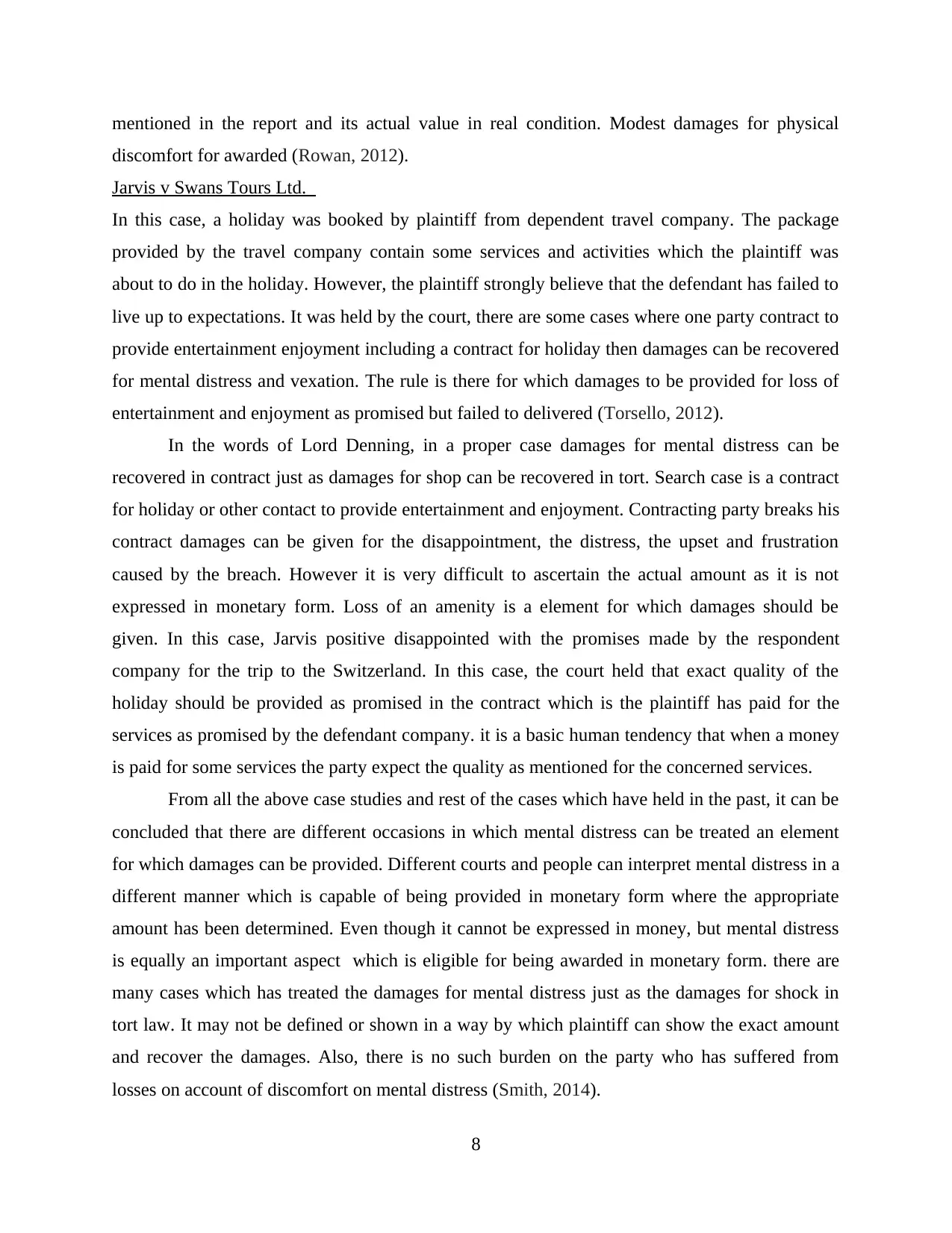
mentioned in the report and its actual value in real condition. Modest damages for physical
discomfort for awarded (Rowan, 2012).
Jarvis v Swans Tours Ltd.
In this case, a holiday was booked by plaintiff from dependent travel company. The package
provided by the travel company contain some services and activities which the plaintiff was
about to do in the holiday. However, the plaintiff strongly believe that the defendant has failed to
live up to expectations. It was held by the court, there are some cases where one party contract to
provide entertainment enjoyment including a contract for holiday then damages can be recovered
for mental distress and vexation. The rule is there for which damages to be provided for loss of
entertainment and enjoyment as promised but failed to delivered (Torsello, 2012).
In the words of Lord Denning, in a proper case damages for mental distress can be
recovered in contract just as damages for shop can be recovered in tort. Search case is a contract
for holiday or other contact to provide entertainment and enjoyment. Contracting party breaks his
contract damages can be given for the disappointment, the distress, the upset and frustration
caused by the breach. However it is very difficult to ascertain the actual amount as it is not
expressed in monetary form. Loss of an amenity is a element for which damages should be
given. In this case, Jarvis positive disappointed with the promises made by the respondent
company for the trip to the Switzerland. In this case, the court held that exact quality of the
holiday should be provided as promised in the contract which is the plaintiff has paid for the
services as promised by the defendant company. it is a basic human tendency that when a money
is paid for some services the party expect the quality as mentioned for the concerned services.
From all the above case studies and rest of the cases which have held in the past, it can be
concluded that there are different occasions in which mental distress can be treated an element
for which damages can be provided. Different courts and people can interpret mental distress in a
different manner which is capable of being provided in monetary form where the appropriate
amount has been determined. Even though it cannot be expressed in money, but mental distress
is equally an important aspect which is eligible for being awarded in monetary form. there are
many cases which has treated the damages for mental distress just as the damages for shock in
tort law. It may not be defined or shown in a way by which plaintiff can show the exact amount
and recover the damages. Also, there is no such burden on the party who has suffered from
losses on account of discomfort on mental distress (Smith, 2014).
8
discomfort for awarded (Rowan, 2012).
Jarvis v Swans Tours Ltd.
In this case, a holiday was booked by plaintiff from dependent travel company. The package
provided by the travel company contain some services and activities which the plaintiff was
about to do in the holiday. However, the plaintiff strongly believe that the defendant has failed to
live up to expectations. It was held by the court, there are some cases where one party contract to
provide entertainment enjoyment including a contract for holiday then damages can be recovered
for mental distress and vexation. The rule is there for which damages to be provided for loss of
entertainment and enjoyment as promised but failed to delivered (Torsello, 2012).
In the words of Lord Denning, in a proper case damages for mental distress can be
recovered in contract just as damages for shop can be recovered in tort. Search case is a contract
for holiday or other contact to provide entertainment and enjoyment. Contracting party breaks his
contract damages can be given for the disappointment, the distress, the upset and frustration
caused by the breach. However it is very difficult to ascertain the actual amount as it is not
expressed in monetary form. Loss of an amenity is a element for which damages should be
given. In this case, Jarvis positive disappointed with the promises made by the respondent
company for the trip to the Switzerland. In this case, the court held that exact quality of the
holiday should be provided as promised in the contract which is the plaintiff has paid for the
services as promised by the defendant company. it is a basic human tendency that when a money
is paid for some services the party expect the quality as mentioned for the concerned services.
From all the above case studies and rest of the cases which have held in the past, it can be
concluded that there are different occasions in which mental distress can be treated an element
for which damages can be provided. Different courts and people can interpret mental distress in a
different manner which is capable of being provided in monetary form where the appropriate
amount has been determined. Even though it cannot be expressed in money, but mental distress
is equally an important aspect which is eligible for being awarded in monetary form. there are
many cases which has treated the damages for mental distress just as the damages for shock in
tort law. It may not be defined or shown in a way by which plaintiff can show the exact amount
and recover the damages. Also, there is no such burden on the party who has suffered from
losses on account of discomfort on mental distress (Smith, 2014).
8
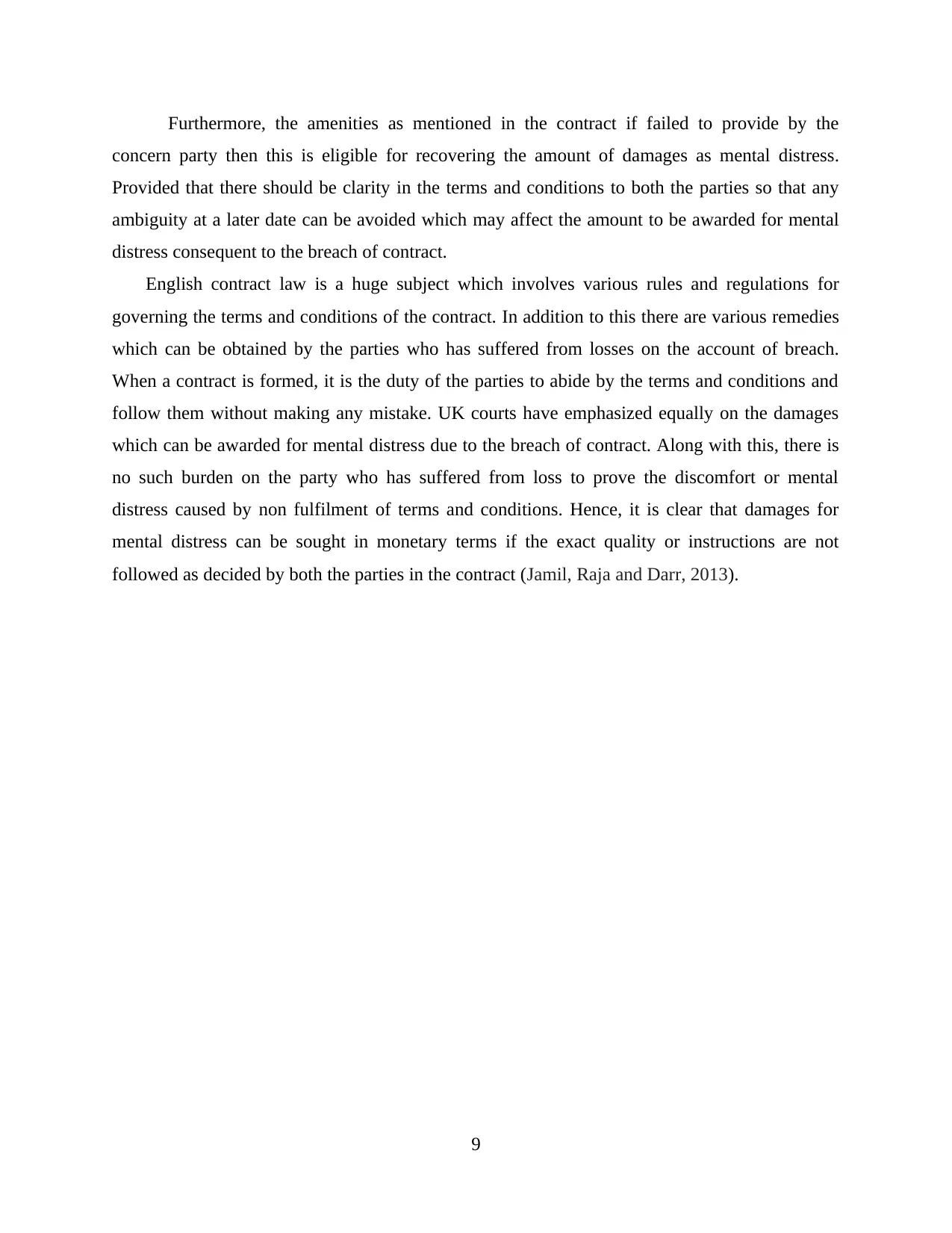
Furthermore, the amenities as mentioned in the contract if failed to provide by the
concern party then this is eligible for recovering the amount of damages as mental distress.
Provided that there should be clarity in the terms and conditions to both the parties so that any
ambiguity at a later date can be avoided which may affect the amount to be awarded for mental
distress consequent to the breach of contract.
English contract law is a huge subject which involves various rules and regulations for
governing the terms and conditions of the contract. In addition to this there are various remedies
which can be obtained by the parties who has suffered from losses on the account of breach.
When a contract is formed, it is the duty of the parties to abide by the terms and conditions and
follow them without making any mistake. UK courts have emphasized equally on the damages
which can be awarded for mental distress due to the breach of contract. Along with this, there is
no such burden on the party who has suffered from loss to prove the discomfort or mental
distress caused by non fulfilment of terms and conditions. Hence, it is clear that damages for
mental distress can be sought in monetary terms if the exact quality or instructions are not
followed as decided by both the parties in the contract (Jamil, Raja and Darr, 2013).
9
concern party then this is eligible for recovering the amount of damages as mental distress.
Provided that there should be clarity in the terms and conditions to both the parties so that any
ambiguity at a later date can be avoided which may affect the amount to be awarded for mental
distress consequent to the breach of contract.
English contract law is a huge subject which involves various rules and regulations for
governing the terms and conditions of the contract. In addition to this there are various remedies
which can be obtained by the parties who has suffered from losses on the account of breach.
When a contract is formed, it is the duty of the parties to abide by the terms and conditions and
follow them without making any mistake. UK courts have emphasized equally on the damages
which can be awarded for mental distress due to the breach of contract. Along with this, there is
no such burden on the party who has suffered from loss to prove the discomfort or mental
distress caused by non fulfilment of terms and conditions. Hence, it is clear that damages for
mental distress can be sought in monetary terms if the exact quality or instructions are not
followed as decided by both the parties in the contract (Jamil, Raja and Darr, 2013).
9
⊘ This is a preview!⊘
Do you want full access?
Subscribe today to unlock all pages.

Trusted by 1+ million students worldwide
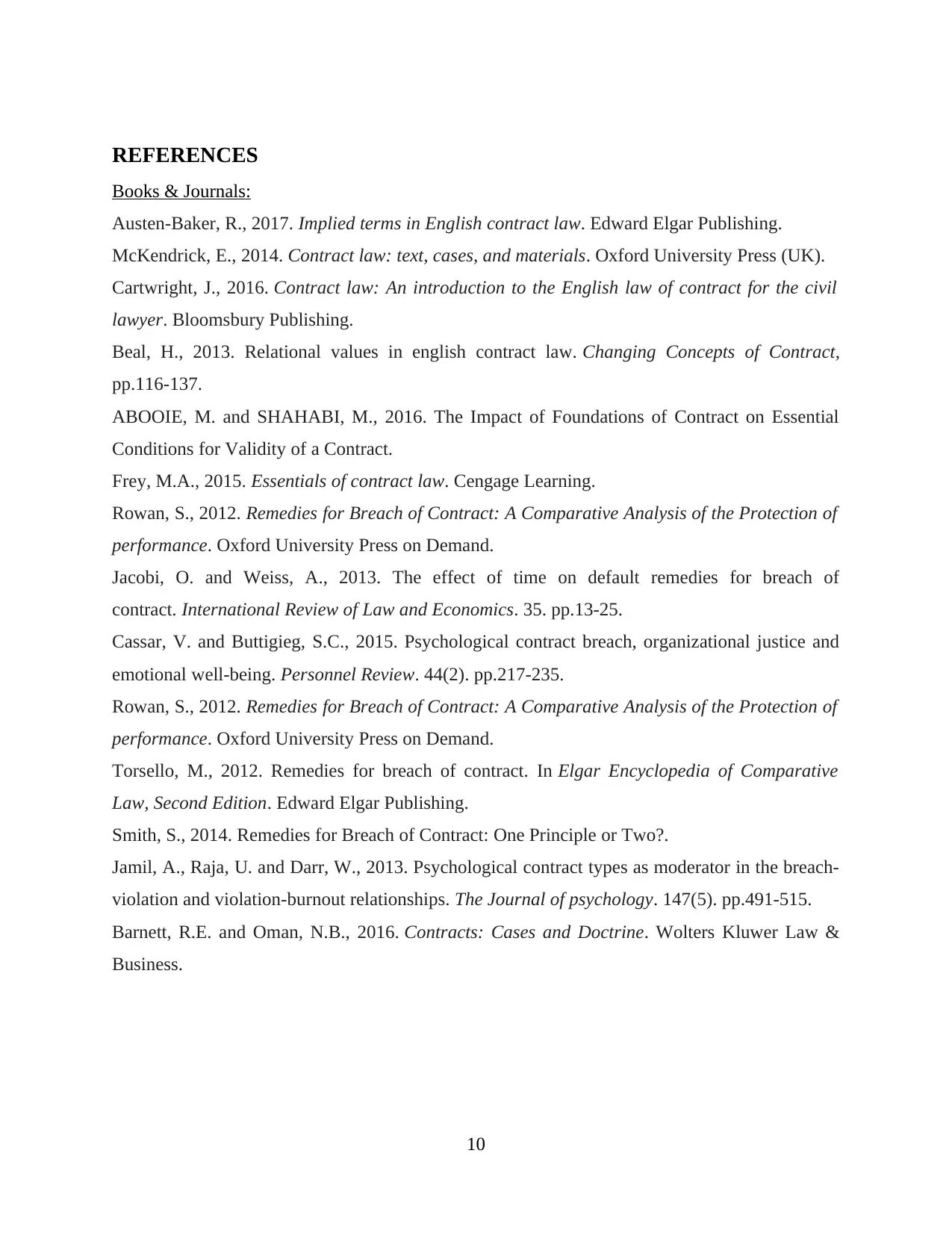
REFERENCES
Books & Journals:
Austen-Baker, R., 2017. Implied terms in English contract law. Edward Elgar Publishing.
McKendrick, E., 2014. Contract law: text, cases, and materials. Oxford University Press (UK).
Cartwright, J., 2016. Contract law: An introduction to the English law of contract for the civil
lawyer. Bloomsbury Publishing.
Beal, H., 2013. Relational values in english contract law. Changing Concepts of Contract,
pp.116-137.
ABOOIE, M. and SHAHABI, M., 2016. The Impact of Foundations of Contract on Essential
Conditions for Validity of a Contract.
Frey, M.A., 2015. Essentials of contract law. Cengage Learning.
Rowan, S., 2012. Remedies for Breach of Contract: A Comparative Analysis of the Protection of
performance. Oxford University Press on Demand.
Jacobi, O. and Weiss, A., 2013. The effect of time on default remedies for breach of
contract. International Review of Law and Economics. 35. pp.13-25.
Cassar, V. and Buttigieg, S.C., 2015. Psychological contract breach, organizational justice and
emotional well-being. Personnel Review. 44(2). pp.217-235.
Rowan, S., 2012. Remedies for Breach of Contract: A Comparative Analysis of the Protection of
performance. Oxford University Press on Demand.
Torsello, M., 2012. Remedies for breach of contract. In Elgar Encyclopedia of Comparative
Law, Second Edition. Edward Elgar Publishing.
Smith, S., 2014. Remedies for Breach of Contract: One Principle or Two?.
Jamil, A., Raja, U. and Darr, W., 2013. Psychological contract types as moderator in the breach-
violation and violation-burnout relationships. The Journal of psychology. 147(5). pp.491-515.
Barnett, R.E. and Oman, N.B., 2016. Contracts: Cases and Doctrine. Wolters Kluwer Law &
Business.
10
Books & Journals:
Austen-Baker, R., 2017. Implied terms in English contract law. Edward Elgar Publishing.
McKendrick, E., 2014. Contract law: text, cases, and materials. Oxford University Press (UK).
Cartwright, J., 2016. Contract law: An introduction to the English law of contract for the civil
lawyer. Bloomsbury Publishing.
Beal, H., 2013. Relational values in english contract law. Changing Concepts of Contract,
pp.116-137.
ABOOIE, M. and SHAHABI, M., 2016. The Impact of Foundations of Contract on Essential
Conditions for Validity of a Contract.
Frey, M.A., 2015. Essentials of contract law. Cengage Learning.
Rowan, S., 2012. Remedies for Breach of Contract: A Comparative Analysis of the Protection of
performance. Oxford University Press on Demand.
Jacobi, O. and Weiss, A., 2013. The effect of time on default remedies for breach of
contract. International Review of Law and Economics. 35. pp.13-25.
Cassar, V. and Buttigieg, S.C., 2015. Psychological contract breach, organizational justice and
emotional well-being. Personnel Review. 44(2). pp.217-235.
Rowan, S., 2012. Remedies for Breach of Contract: A Comparative Analysis of the Protection of
performance. Oxford University Press on Demand.
Torsello, M., 2012. Remedies for breach of contract. In Elgar Encyclopedia of Comparative
Law, Second Edition. Edward Elgar Publishing.
Smith, S., 2014. Remedies for Breach of Contract: One Principle or Two?.
Jamil, A., Raja, U. and Darr, W., 2013. Psychological contract types as moderator in the breach-
violation and violation-burnout relationships. The Journal of psychology. 147(5). pp.491-515.
Barnett, R.E. and Oman, N.B., 2016. Contracts: Cases and Doctrine. Wolters Kluwer Law &
Business.
10
Paraphrase This Document
Need a fresh take? Get an instant paraphrase of this document with our AI Paraphraser

11
1 out of 11
Related Documents
Your All-in-One AI-Powered Toolkit for Academic Success.
+13062052269
info@desklib.com
Available 24*7 on WhatsApp / Email
![[object Object]](/_next/static/media/star-bottom.7253800d.svg)
Unlock your academic potential
Copyright © 2020–2026 A2Z Services. All Rights Reserved. Developed and managed by ZUCOL.




